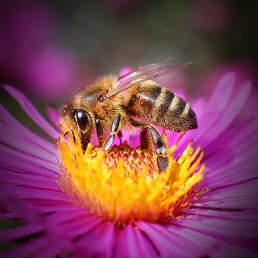Preserving the pollinators to protect human health

Related topics
Agriculture & Forestry Environment & climate action Innovation Belgium Bulgaria Denmark Estonia Finland France Germany Greece Italy Netherlands Poland Spain Sweden United Kingdom Switzerland Climate action, environment, resource efficiency and raw materials Serbiadate: 17/01/2014
Project: Status and Trends of European Pollinator...
acronym: STEP
See also: Info-Centre
Contact: http://www.step-project.net/
The decline of many insect pollinator populations, caused by changing environmental conditions such as habitat loss, climate change, invasive species and pesticide use, is therefore a big concern. Moreover, our ability to counteract these declines is limited because we are still far from understanding them in sufficient detail.
The aim of the European Union (EU)-funded STEP project is to fill this knowledge gap by carrying out, for the first time, a detailed, Europe-wide study of recent trends in pollinators and insect-pollinated plants, together with an assessment of the factors shaping those trends and an evaluation of their eventual ecological and economic impacts. On the basis of this research, the eventual goal of the project team is to provide guidance on potential mitigation strategies.
For STEP’s Project Coordinator, Professor Simon G Potts of Reading University in the United Kingdom, the importance of this research for human wellbeing can not be overstated. “We looked at all the main European crops and found that those which provide most of the micronutrients – the vitamins and minerals in our diet, the things that are really important for human health – are almost all insect-pollinated”, he says. “The link is clear: healthy pollinators, healthy pollination, healthy human diet,” he adds.
With more than a year still to run, the project has already yielded a number of benefits. “First of all,” says Professor Potts, “by enabling the first proper quantitative assessment of how bad the declines are in various pollinators and plants across Europe, the STEP project has helped frame the challenge.”
Another major output (“one which genuinely surprised me”, comments Professor Potts) has been the discovery that honey bees are not, as is widely assumed, the main providers of pollination in Europe. “Honey bees are important, but it is really the wild insects that are the main pollinators of our crops and therefore have the main economic value,” he explains.
Other important findings highlighted by Professor Potts include confirmation that, again contrary to popular opinion, ‘agri-environment’ schemes, in which farmers are paid for delivering environmental benefits rather than producing food, for example by planting flower strips, “can work fantastically well for pollinators.”
The STEP team has also shown that individual drivers of pollinator decline, such as habitat loss, disease, pesticide use and pollution, pests, pathogens or invasive species, need to be studied for their combined effects rather than individual impact. “Most bees can tolerate a low level of a pesticide, for example,” explains Professor Potts, “or a low level of a virus. But put those two low levels together and it can be absolutely devastating. If we just study one factor, we are probably not going to find the answers.”
When it comes to informing future policy, Professor Potts identifies three main areas to which STEP could contribute. The first is having the role of pollinators properly recognised. “Nobody questions fertilisers or machinery as essential inputs into growing food, but pollinators are just not on the list,” he says.
“Getting policies that explicitly recognise this would be a big step forward.” The second is highlighting the need for a long-term strategy for all pesticides, rather than only focusing on individual categories, as recently happened with neonicotinoids, a relatively new group of insecticides which have been associated with a decline in bee populations. The third is the chance to use the ‘flagship example’ of pollination to demonstrate that biodiversity is not just important for its own inherent value, but for the tangible economic benefits it provides – its so-called ‘ecosystem services’.
Related artcile: How are the bees doing?
